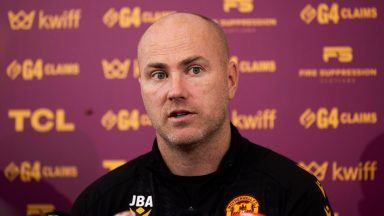Hibernian owner Ron Gordon has revealed that a review of the Scottish league and its commercial deals found the SPFL’s current broadcast agreement to be “marginally undervalued”.
Premiership clubs have welcomed a new ‘action plan’ from the league that aims to increase income for clubs from £28.4m currently to £50m by 2029. The plan is based on findings from a strategic review by accountancy firm Deloitte, which was commissioned by Hibs, Hearts, Aberdeen, Dundee and Dundee United.
One of the central pillars of the new strategy will be to maximise the potential of broadcasting SPFL games, with Sky currently holding live rights and a number of other broadcasters having secondary or overseas rights.
While a new deal is expected to offer a substantial increase on the current agreement in terms of games broadcast and income generated, Gordon revealed that the existing arrangement was seen as undervalued. However, he explained that a careful balance had to be struck to maintain attendance levels in stadiums around the country, while allowing for innovation.
“It’s kind of the ‘big kahuna’ on the table is the broadcasting deal,” the businessman told STV.
“The Deloitte study said that we were marginally undervalued. I personally think that is probably true if you just look at the rights scenario.
“There are many other things that can come around the broadcasting.
“We want to do it in a way that protects the gate because so much of our football and our revenues are driven by attendance.
“We are one of the leagues in Europe with the highest attendance per capita and we want the stadiums to be full because you want that atmosphere. So we don’t want to do anything that would cannibalise that. Everybody is very protective of that.
“When you look at some of the league in Europe that perhaps have more value [in their broadcast deal] they give many, many more games [to live TV] and their attendances are much lower than ours. We have been trying to find a balance.
“When you add Scotland are probably one of the highest values on a per game basis other than the top leagues. We get on average £500,000 per game which is very high compared to an Austria or a Denmark who put all their games out to broadcast.
“We have had conversations with Sky about building that partnership and this is a big part of the strategic plan – growing it and making it a more robust partnership.
“Included in our conversations are more games – in two tranches, going up to 60 and then potentially to 80 games – out of a total possible offering of 218 games.
“Also included is a carve-out on pay-per-view which doesn’t exist right now – we previously had a waiver because of Covid.
“Another element of our conversation with Sky is a carve-out so that clubs could have a number of pay-per-view opportunities.”
The announcement of the new plan for the league body stressed that the improvements weren’t just for the benefit of men’s top flight teams and Gordon, who was one of the driving forces behind the original review, was keen to point out that there were revenue opportunities at all levels that could help across the game in Scotland.
“We have significant monies in for the women’s game,” he said. “There was £100,000 for the women’s game last season in licensing revenues, that’s gone up to £160,000 with the new deal signed with the BBC.
“Those deals are not exclusive so we can continue to do more.
“But the conversation with Sky would take the annual investment in the women’s game to £500,000. When you aggregate all that, it is significant.”
While the focus has mainly been on the significant deal for live Premiership games, the Hibernian boss believes that there are ancillary benefits that will lift the standard of the game across the board, with noticeable improvements in medium-term finances if everything goes to plan.
He explained: “There are other elements which I call ‘soft benefits’ – better production values, more content around the Scottish game, the opportunity to jointly sell – essentially just building a partnership that is more robust.
“When you look at all that the possibilities of growing the revenues are substantial. Potentially we could increase our revenues by 50% in three years.
“We have work to do in terms of selling secondary packages and things like that but it would move the needle significantly.
“So I am excited about that, hopefully it will come to pass and if it does then I think we are taking a very significant and important step forward.”
Follow STV News on WhatsApp
Scan the QR code on your mobile device for all the latest news from around the country



 SNS Group
SNS Group


























